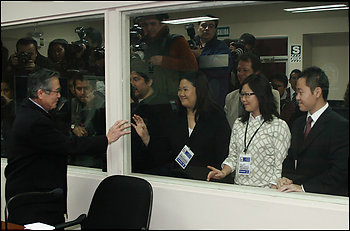
(above) During his trial at a police base
in Lima, former Peruvian president Alberto Fujimori waves to his children:
Congresswoman Keiko Fujimori, third from right; Sacha Fujimori, second
from right; and Kenyi Fujimori, right. (By Paco Medina -- Associated
Press)
In Testimony, Former Spy Chief Says Peru's Fujimori Is Innocent
Montesinos Denies His Former Boss Was Involved in Death Squads
July 1, 2008 - Washington Post
By Lucien Chauvin, Special to The Washington Post
LIMA, Peru, June 30 -- Former president Alberto Fujimori and his security chief, Vladimiro Montesinos, who together wielded unprecedented powers in Peru throughout the 1990s, faced one another in a Lima courtroom Monday, the first time the two had seen each other since fleeing the country nearly eight years ago.
Montesinos, appearing in court to testify in Fujimori's trial on human rights abuses, denied that his former boss was tied to the death squads that operated with impunity at the height of Peru's war against insurgents.
"President Fujimori has no responsibility in the matters of this case," said Montesinos, 63, who worked alongside the former president during his 10 years in office.
Fujimori, 69, has been charged as "indirect perpetuator" behind the Colina Group, an army death squad that has been linked to numerous atrocities committed during the 1990s. Several leaders of the group have already been found guilty and sentenced to 30 years in prison.
Slightly more than half of the Peruvians surveyed in a poll last month said they believed Fujimori was guilty of the charges he faced. But most also ranked his government as one of the best in recent history because of its success in wiping out insurgents, principally those associated with the group known as the Shining Path. Fujimori is only being tried in connection with some of the more notorious atrocities, including two mass murders and kidnappings.
Montesinos is already serving up to 20 years for crimes including corruption. He faces a 35-year sentence in a separate trial if convicted of organizing the Colina Group.
On Monday, Montesinos testified for more than three hours before invoking his right to remain silent. Lawyers involved in the case said his remarks were not surprising.
"Fujimori and Montesinos have already cut a deal. He defended his old boss and obviously expects something in return," said Ronald Gamarra, a lawyer representing victims of the Colina Group.
Montesinos was the 75th and nearly final witness in the trial, which began in late December. It is the former president's second trial on charges stemming from his decade in the presidential palace. He was found guilty late last year and sentenced to six years for an illegal raid he ordered on the home of Montesinos's estranged wife.
Fujimori and Montesinos fled Peru separately in 2000 to avoid the fallout of a corruption scandal, sparked by a videotape that showed Montesinos bribing a congressman for political support.
The former intelligence chief was arrested in June 2001 in Caracas, Venezuela, and immediately brought home. He has been tried in 27 cases since then. He is believed to have stolen more than $1 billion from the government, about a third of which has been located.
Fujimori left Peru the following month to attend an Asia-Pacific summit in Brunei, but never returned. He faxed home a letter offering his resignation, which Congress rejected before impeaching him. He moved to Japan, his parents' homeland, where he lived until 2005. He secretly traveled to Chile in October of that year with the apparent intention of returning to Peru. Instead, he was arrested by Chilean authorities and eventually extradited in September 2007 to stand trial.
Montesinos did not express any animosity toward Fujimori on Monday, as he had in the past. Dressed impeccably in a black suit accessorized by a bright blue necktie, matching pocket handkerchief and silver cuff links, the former spy chief praised his onetime boss for his role in defeating insurgents. He was careful, however, to couch his praise in the words of others, including Abimael Guzmán, founder and leader of the Shining Path, whom Montesinos said recognized Fujimori as a serious challenge.
A lawyer by trade, Montesinos also demonstrated his political and intellectual prowess, attacking the prosecutor, José Paláez, and trying to lecture the lead judge, César San Martín, on how to run the trial.
When asked his profession, Montesinos responded "inactive intelligence officer," and when peppered with questions from Paláez, he said he could not remember every detail, "even though I have a great memory."
He also tried to clear his sordid reputation, saying a court martial in the 1970s and the treason charge levied against him in the 1980s were bogus. He told the court that he would not answer any questions about his work at the National Intelligence Service, because intelligence officers, including former CIA director George Tenet, were bound by code never to reveal details of their work.
"The dominion Montesinos felt he had over the room was shocking. He acted like he was still in power, not someone serving a 20-year sentence on gunrunning," said Jo-Marie Burt, a Latin American studies professor at George Mason University, who was in Peru to observe the trial.
"This trial has been serious and transparent up until now. Montesinos tried to make a circus of it, but that did not happen," she added.
There are only four more witnesses in the Fujimori trial, including former Gen. Nicolás Hermoza Ríos, who is also in prison for embezzling more than $20 million.
Fujimori, Montesinos and Hermoza Ríos once formed a troika that attempted to rule the country by decree after the former president shuttered Congress and the judiciary in April 1992.